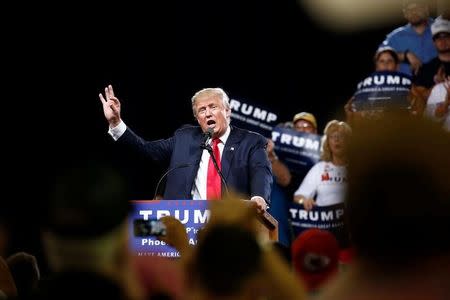In Brexit vote, echoes of Trumpism minus Donald Trump
By James Oliphant and Emily Stephenson WASHINGTON (Reuters) - To U.S. voters who have witnessed the rise of Donald Trump, the campaign urging Britain to abandon the European Union may appear eerily familiar. There’s the nationalism, the romanticized nostalgia for an earlier time, the mistrust of political and financial elites, and the fears that migrants are bringing crime and stealing jobs. Call it Trumpism minus Trump, the New York real estate developer who has emerged as the presumptive Republican presidential nominee in the 2016 U.S. elections. If British citizens vote on Thursday in favor of exiting the European Union, it would allow Britain to negotiate its own trade deals and better control who enters the country, among other things. Both sides in the polarized debate have mounted extensive campaigns and polls show the vote could be close. Trump, who will travel to Britain this week, supports the "Leave" camp, popularly known as Brexit. “I would personally be more inclined to leave, for a lot of reasons like having a lot less bureaucracy,” he told The Sunday Times. He has spent much of his presidential campaign warning of the dangers posed by undocumented immigrants from Mexico and refugees from the Middle East and has proposed building a wall along the southern border of the United States. Syrian refugees have also been center stage in the Brexit debate, with pro-exit forces arguing that Britain must do more to curb the flow of economic migrants from the Middle East and elsewhere. "I see similar themes on both sides of the Atlantic - a strong sense of threatened national identity, anti-globalization, nostalgia, and a sense that elites aren't accountable," said Wendy Rahn, a political science professor at the University of Minnesota who has studied Trump voters. Trump's campaign and the Brexit movement are two of the starkest examples of a new strain of conservative populism that stretches beyond the United States and Britain, into Sweden, France, Poland and elsewhere in Europe. KEEPING A DISTANCE As with Trump’s candidacy, the Brexit forces have been marked by accusations of xenophobia. Nigel Farage, leader of the U.K. Independence Party - and like Trump, a businessman turned politician - earned widespread scorn last week for a poster showing a swell of Syrian refugees and warning Europe is at a "breaking point.” More mainstream supporters of Brexit have kept their distance from figures like Farage. Similarly, some prominent Republicans in the United States, such as former White House candidates Jeb Bush and Mitt Romney, have tried to separate themselves from Trump, who renewed his call last week for a ban on Muslims traveling to the United States. “We want to remain a free and open society,” Trump said, after a gunman killed 49 people in a mass shooting in Orlando. “Then, and if we do, then we have to control our borders.” Trump’s ascent has also been fueled by a disdain for political and financial elites, a hostility shared by Brexit advocates who say their interests are being ill-served by globalization. “Politicians are now just in it for themselves,” said Justin Bellhouse, an organizer for the “Leave” campaign in Bracknell, England. Bellhouse is no fan of Trump, whom he calls “ridiculous,” but he argued that controls on migration are needed to create more opportunity for British workers. American jobs for American workers is a favorite Trump theme. Brexit supporters mirror Trump voters, said Charles Grant, director of the Centre for European Reform, a pro-EU think tank based in London, in that they tend to be older, white, less affluent, and less likely to live in urban areas. Also, as Trump vows to “Make America Great Again,” Brexit backers are wistful for a bygone age. “There is a feeling among some that they’re trying to get back to when Britain was white, when England was more secure,” Grant said. Trump's support for Brexit has been seized upon by U.S. political consultants advising the groups that oppose the referendum, including Jim Messina, who ran U.S. President Barack Obama's re-election campaign in 2012. “Trump’s advice on Brexit would lead UK economy the same place his Atlantic City casinos ended up: LOSER,” Messina tweeted last month. (Reporting by James Oliphant and Emily Stephenson. Writing by James Oliphant, editing by Ross Colvin)



